The Venice Film Festival is being held for the second time in the COVID emergency. The widespread vaccination has kept the infection rate low, allowing the event to go ahead without too many problems. The first screenings went fairly smoothly, under strict surveillance and with orderly queues outside the cinemas. More chaotic this year, however, has been the system of online seat reservations – in cinemas with half the capacity and each spectator at a distance – which has worked rather badly, as the presence of accredited people has probably been much greater. In this way, the system has not allowed on many occasions to reserve a place for all the screenings desired. Due to this limitation, the number of works I was able to see was restricted, preferring, when possible, works in competition and some outside the official competition.
Pedro Almodóvar’s latest film has officially opened the competition. Parallel Mothers is about mothers and daughters within a narrative framework that involves personal stories, ancestors and historical memory. Janis (an excellent Penélope Cruz) gives birth on the same day as Ana, a young teenage stranger (Milena Smit). Between the two women and their two children, a relationship develops that leads throughout the film to a series of lies and truths that turn them into victims of a painful development, where they are confronted with a reality full of uncertainties.
The plot fits perfectly with Almódovar’s melodramatic style, which this time, however, is more austere, following the dry character that has characterized the La Mancha-born director’s last two films, Julieta and Pain and Glory. There is hardly any humour and the surrealistic moments that characterized his previous works are absent. Thus is born a film that proceeds in a very linear way and where the camera seems almost to caress the characters, leaving us with a very convincing female portrait and capable of making us reflect on what is important to keep alive in the memory, having to give up much in order to pursue the need to keep the truth alive.
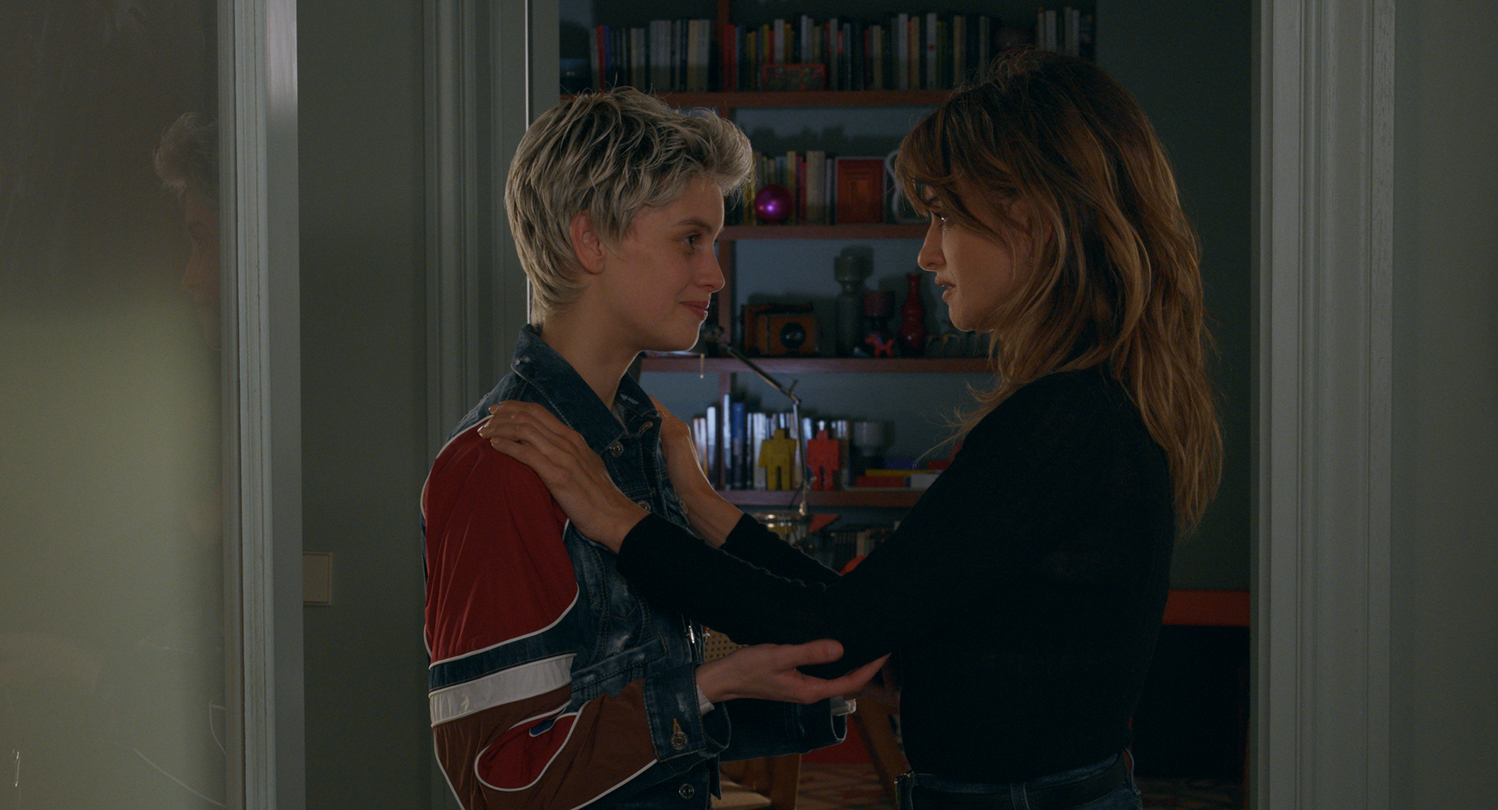
Penelope Cruz and Milena Smit in Parallel Mothers.
Continuing with the relationship between mother and children—but from the point of view of distance, misunderstanding, and selfishness— Maggie Gyllenhaall’s first film is also about this. A refined and intellectual actress, Maggie chooses for her first directorial work the story of Leda (played by an intense Olivia Colman), a middle-aged woman on holiday in Greece. Her days are marked by the disturbing presence of a young mother (played by Dakota Johnson) and her daughter, which triggers an unease in her that stems from her past as a mother.
Inspired by a novel by the Italian writer Elena Ferrante, The Lost Daughter presents a visual style that forces the spectator to follow the main character closely, leaving the audience with the sensation of living Leda’s vicissitudes, her anxieties, her misgivings, and her disturbed moods in first person. A formal strategy that works only to a certain extent, since especially in the last half hour of the film everything becomes too redundant and tiresome, giving us a somewhat forced ending, due to the need to find a solution to the vicissitudes of the main character.

Olivia Colman in The Lost Daughter © Yannis Drakoulidis.
The film by Pablo Larrain, a regular director at the Venice Film Festival, also has a similar problem. The Chilean director seems fascinated by tragic female figures. After having explored the figure of Jacqueline Bouvier Kennedy in Jackie —presented at the 2016 Mostra— this time the director has focused on that of Diana Spencer. In Spencer, Larrain tells the story of Lady Diana’s life at a specific time and in a specific narrative arc: the weekend in which the then Princess of Wales made the decision to move away from the courtly life of the Windsors to start a new independent life. The film recounts the Christmas days of Diana and the royal family at the Sandringham residence, focusing exclusively on the Princess’s emotional, anguished reaction.
The unbearability of court life and intolerance to the labels she suffers are narrated by alternating the realism of some scenes with others based on an almost surrealistic nuance, describing the most intimate moments experienced by the main character. Kristen Stewart —who has to be credited with a great job in the way she has recreated the mannerisms of the real Diana— is the absolute protagonist of almost two hours of footage, of which each passing minute becomes heavier, as the excessive insistence on fantasies and visual nightmares is not always effective. Nor is the good cast of English actors and a remarkable reconstruction of the original setting and sets enough to lift a film that is only minimally successful.
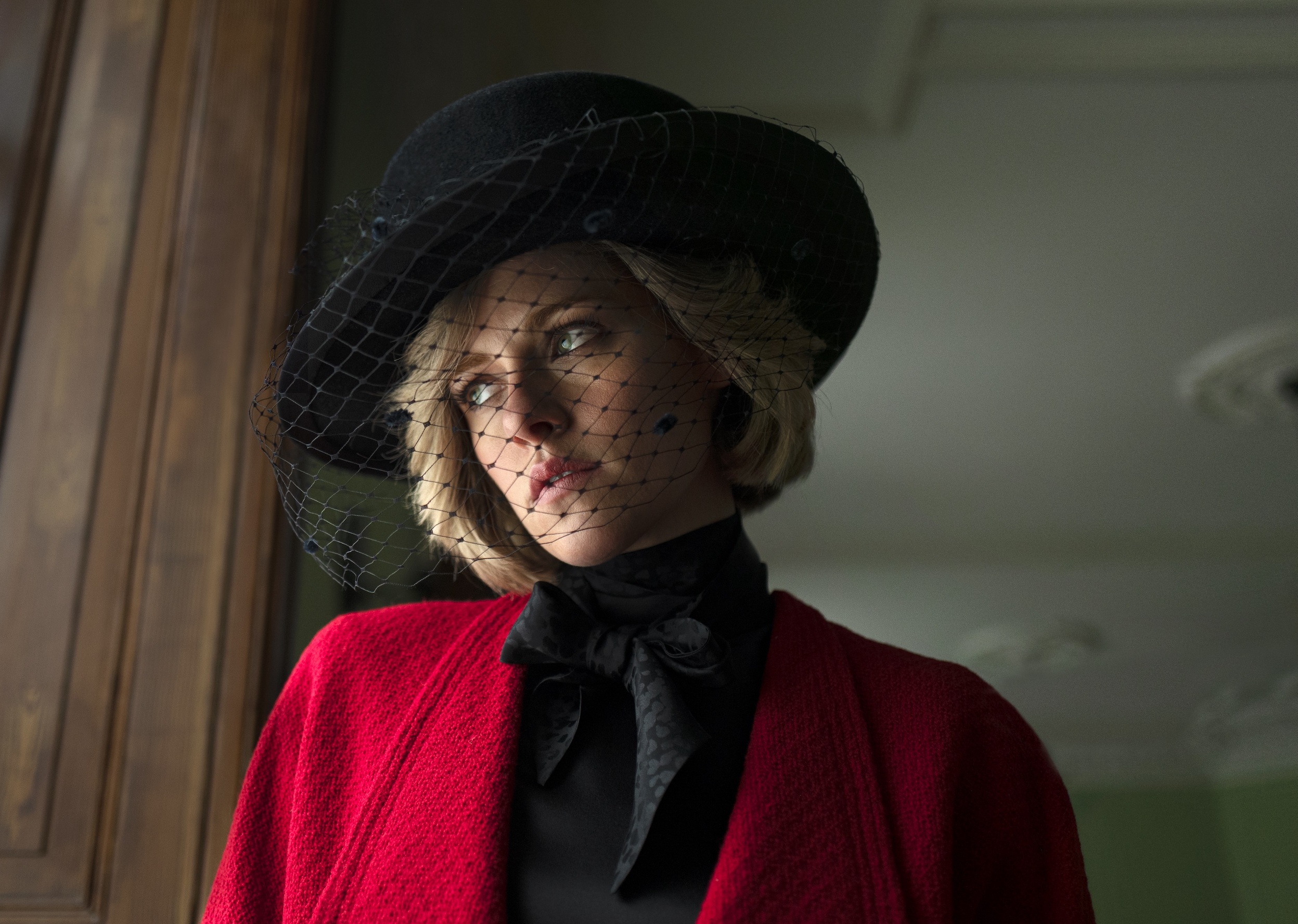
Kristen Stewart as Lady Diana.
By contrast, the first of the five Italian films in competition was much better: È stata la mano di Dio by Paolo Sorrentino. The Neapolitan director returns to the Mostra with a feature film after twenty years, when in 2001 he released his first work L’uomo in più. Curiously, the recurrence is twofold, as Sorrentino also returns to his hometown of Naples with this new work, after having chosen different settings for all his other films. The choice was marked by the need to tell a very personal story for the first time. È stata la mano di Dio is essentially the story of the young Sorrentino (played very well by the almost debutant Filippo Scotti), of the Neapolitan environment in which he grew up and of the tragedy in which he lost his parents (victims of carbon monoxide poisoning in the family’s mountain house), and which he survived thanks to having gone to see Maradona‘s Napoli team play that day.
The title of the film in fact emphasizes the famous Argentinian footballer’s saying after beating England in the 1986 World Cup in Mexico (the year in which the film takes place), when he said that winning was “the hand of God”. Sorrentino achieves a more linear and narrative work than his previous films, where he limits the almost surrealistic scenes that characterize his peculiar style. The visual fantasy typical of the author is not lacking, nor are his extravagant characters, but they are at the service of a drier, less redundant story, where the illusions, joys, and despair of a young man who believes in the possibility that everything can be useful, including pain, to look forward to a new life.
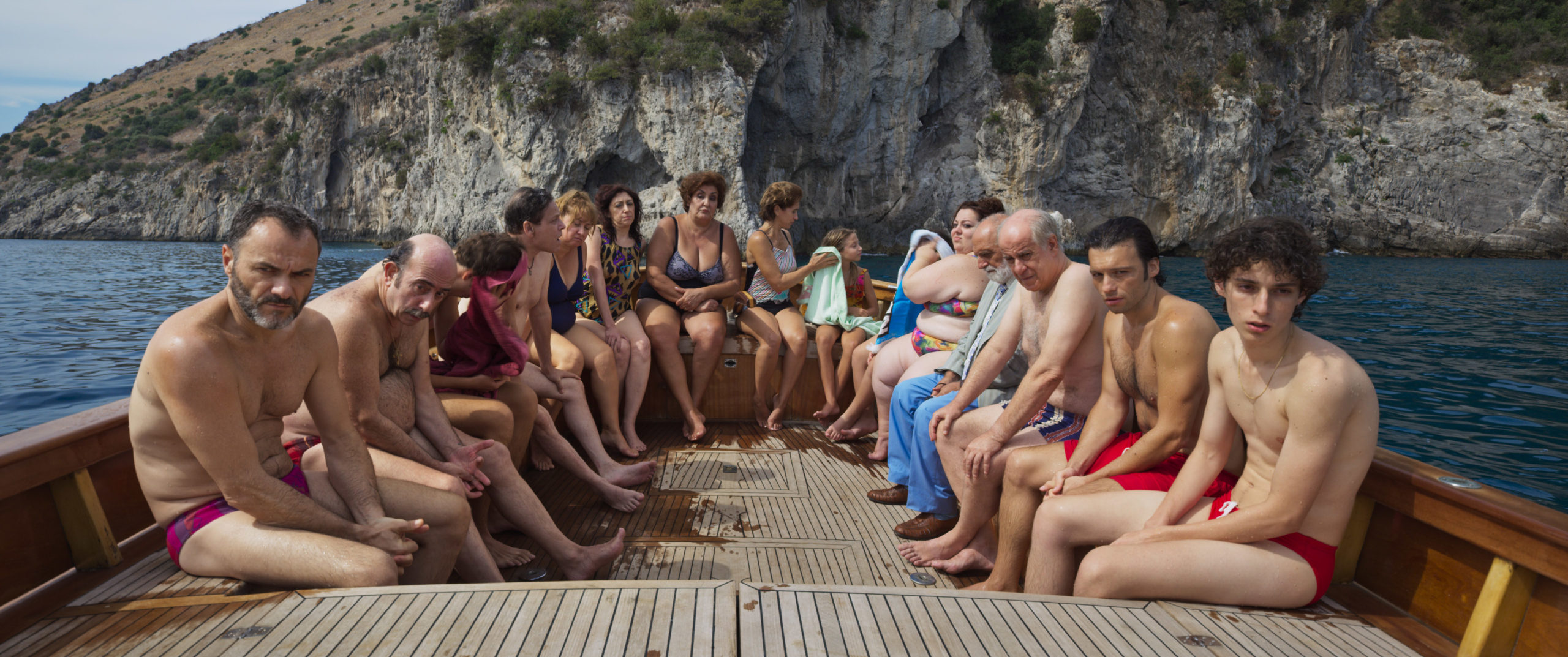
È stata la mano di Dio. © Netflix
The main character in Paul Schrader‘s film The Card Counter, which returns to Venice after the unsuccessful First Reformed in 2017, also wants a new life. William Tell is an ex-convict who spends his time traveling around the United States playing in various casinos thanks to his expertise in card counting. In reality, he does so in an attempt to resolve an inner conflict that distresses him and that he seems to be able to master only by maintaining a linear and in many ways anonymous and nondescript life. Finding and helping a young man who seems to suffer from the same restlessness as he does offer him the chance to find a form of catharsis for his existence, but plans don’t always work out the way you want them to.
Schrader tells his umpteenth story of guilt and atonement in a very linear and austere style, masterfully using the essential performance of a remarkable Oscar Isaac. The pace is leisurely but engages the viewer at every minute until the end, reminiscent in its almost inexorable denouement —despite the totally different plot— of the journey followed by the thief in Robert Bresson‘s Pickpocket, an author much loved by the American director.
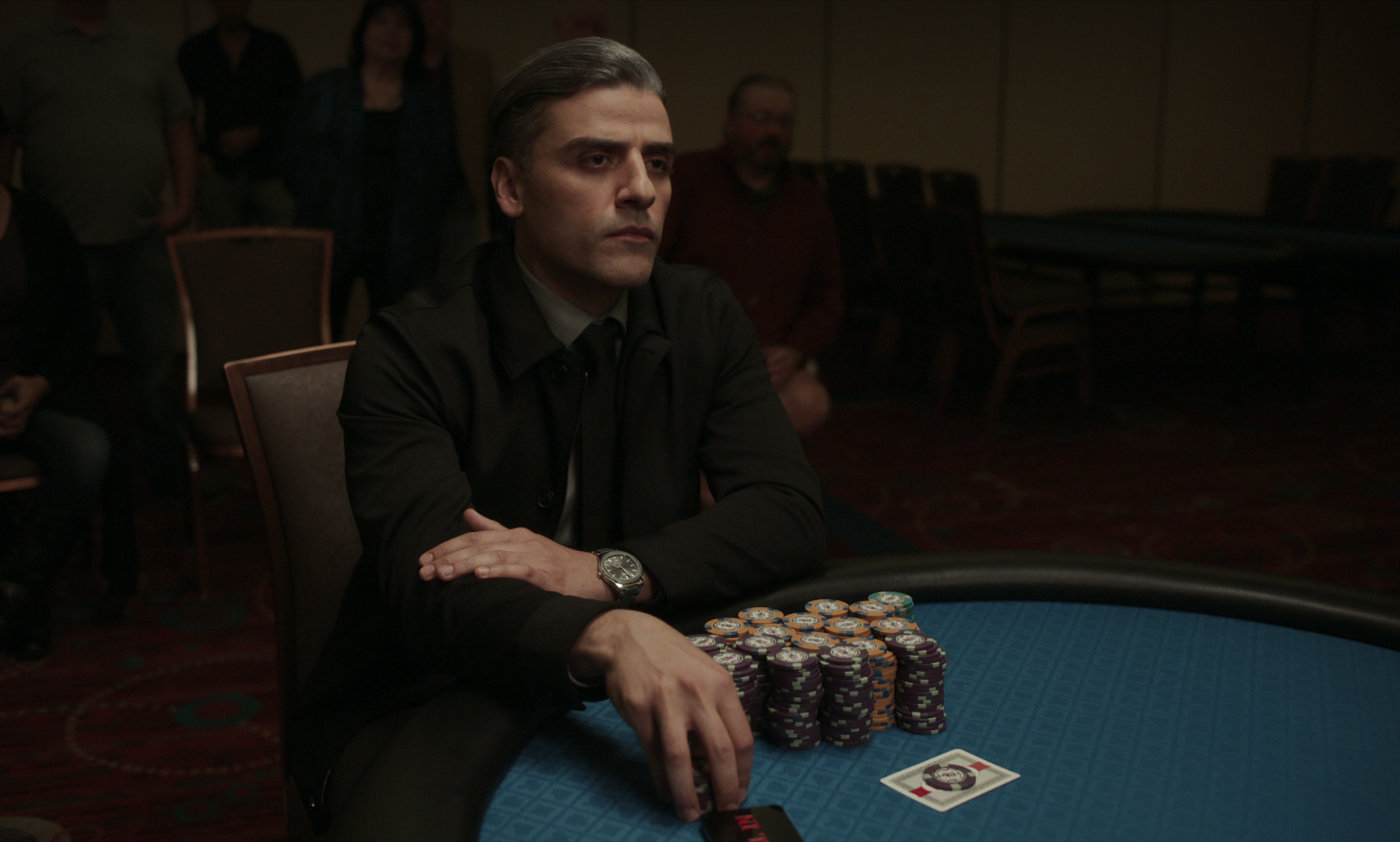
Oscar Isaac in The Card Counter. ©2021 Focus Features, LLC
Also interesting is Il Buco by Italian director Michelangelo Frammartino. An attempt at extreme cinema, as its little more than ninety minutes are spent without dialogue or music. The style is close to that of a documentary, focusing on the story of a speleological expedition that, in 1961, studied a cave more than 600 meters deep in southern Italy. The filmmaker makes us experience the descent into the depths of the earth as a difficult and distressing journey, which seems to have no end, by introducing his camera into the actual cave that was explored in the past. At the same time, he depicts the work, life, and death of a local shepherd, creating parallelism that is evocative, if at times a little pretentious and forced. The pace is leisurely, but never tedious, thanks to suggestive images between light and darkness.
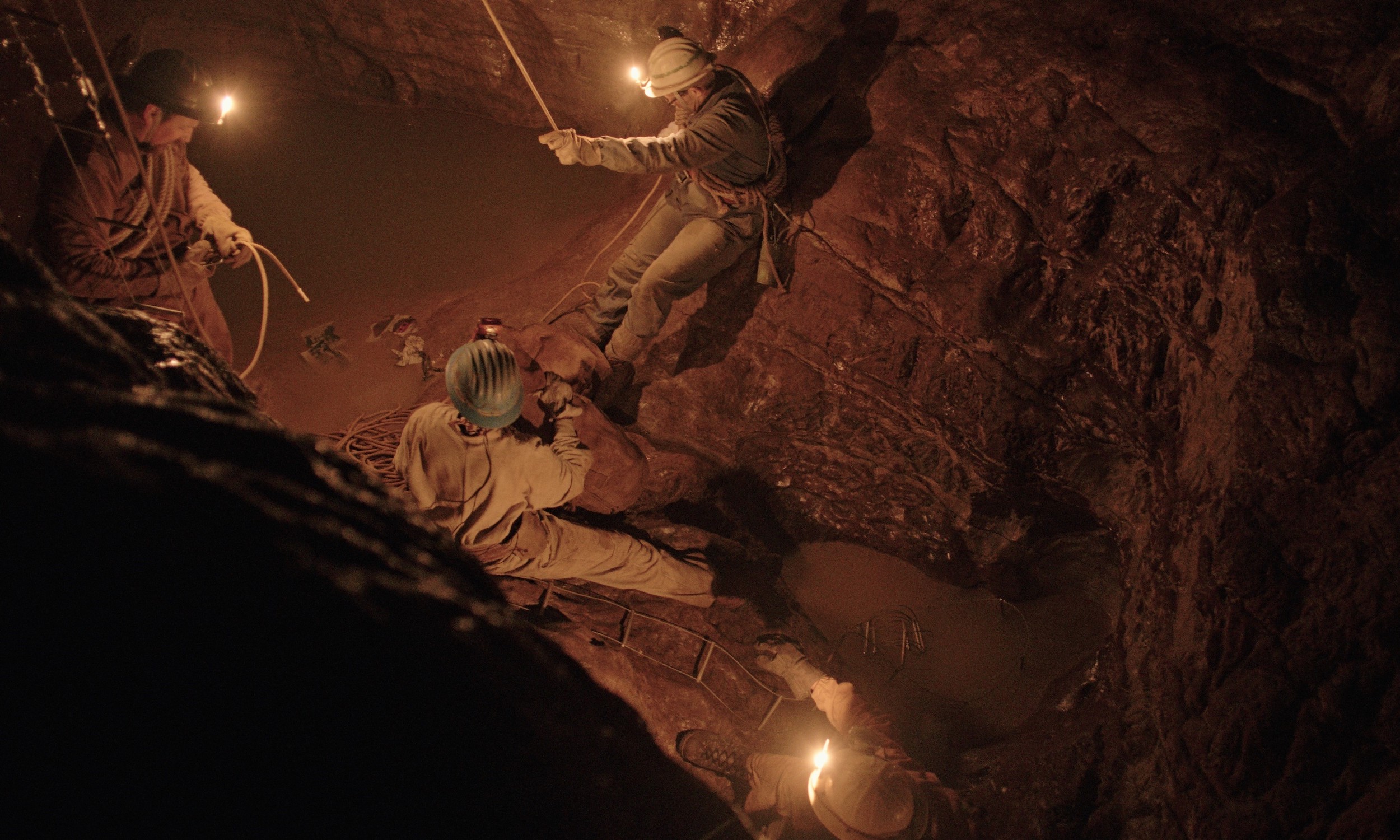
Il Buco.
Among the big names in the official selection at Venice was also Jane Campion, who returns to feature films after a 12-year absence, following her successful Bright Star in 2009. Inspired by a 1967 novel by Thomas Savage, The Power of the Dog tells the story of two brothers, Phil and George Burbank, wealthy ranchers in 1920s Montana. Both run their ranch; George (Jesse Plemons) is a methodical, respectable man, while Phil (an immense Benedict Cumberbatch) is a gruff, dark character with homophobic traits who seems to devote himself only to the more practical aspects of ranching. The entry of a local widow Rose (Kristen Dunst) and her fragile and troubled son Peter (Kodi Smit-McPhee) into the lives of the two brothers triggers a series of tensions in Phil that will lead to an unpredictable turn of events.
Campion achieves a very suggestive film in terms of the psychological development of the characters and the visual aspect, as always in his work, is very suggestive and lyrical. There are several moments in which the New Zealand director’s camera manages to convey anguish and unease with penetrating close-up shots and evocative, dazzling landscape images. Less convincing, however, is the way in which the story is told, which is somewhat rushed in the final minutes, detracting somewhat from the strength of the rest of the film, which up to that point was undoubtedly fascinating.

Timothée Chalamet y Rebecca Ferguson en Dune.
In the first days of the Venice Film Festival, the out-of-competition section was highlighted above all by the presence of Dune, the American blockbuster production by director Denis Villeneuve. A work of great ambition and with a stellar cast, starting with the young Timothée Chalamet in the role of Paul Atreides, Dune was presented as the beginning of a project that will certainly be more extensive and will see other titles from the famous science fiction saga devised by Frank Herbert on the screen. In fact, the film presents only the beginning of a story that is suspended halfway through, despite the 155 minutes of this first part.
The result is a prodigy of special effects, never before seen so realistic and fascinating, and a highly evocative setting. However, some of the characters seem only sketched, others lack the necessary depth and the narrative rhythm is somewhat dull, while the soundtrack ends up being tedious, excessively redundant and at many moments unnecessarily deafening. If the intention was to do something different from David Lynch‘s 1984 version, Villeneuve has undoubtedly succeeded, but by renouncing the disturbing originality, visual and narrative, that characterized its illustrious predecessor.

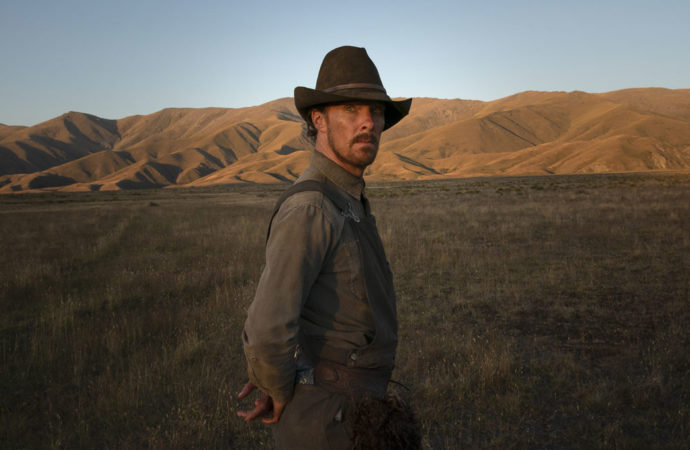




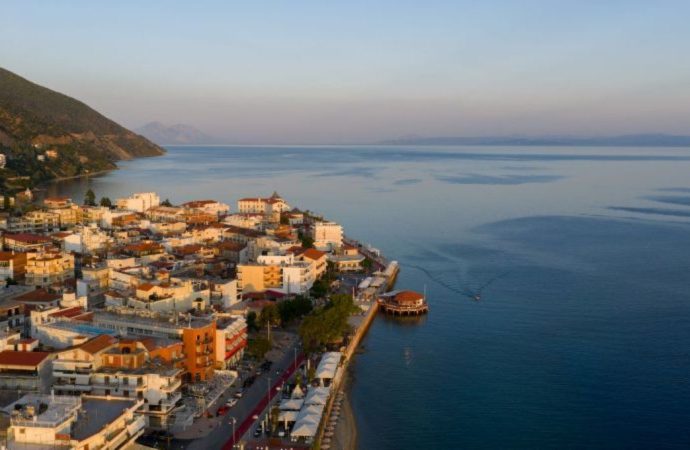
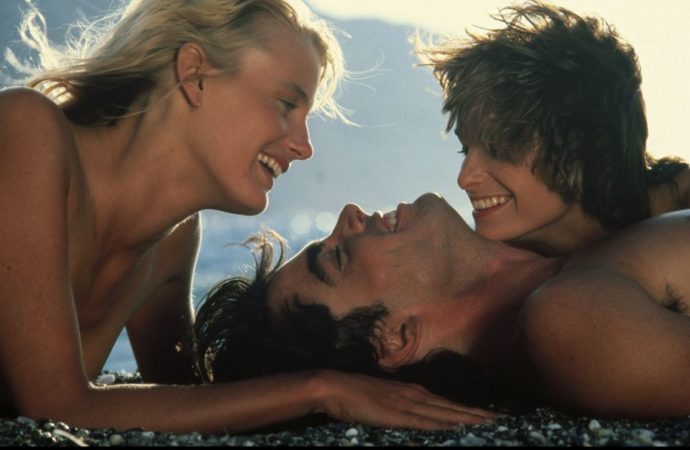

No one has posted any comments yet. Be the first person!